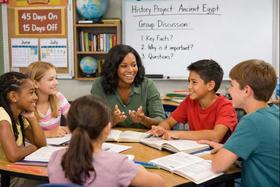For the 2026 school year, there are 5 public high schools serving 4,669 students in Bel Air, MD.
The top-ranked public high schools in Bel Air, MD are Harford Technical High School, C. Milton Wright High School and Patterson Mill High School. Overall testing rank is based on a school's combined math and reading proficiency test score ranking.
Bel Air, MD public high schools have an average math proficiency score of 42% (versus the Maryland public high school average of 34%), and reading proficiency score of 69% (versus the 56% statewide average). High schools in Bel Air have an average ranking of 9/10, which is in the top 20% of Maryland public high schools.
Bel Air, MD public high school have a Graduation Rate of 95%, which is more than the Maryland average of 86%.
The school with highest graduation rate is Bel Air High School, with 96% graduation rate. Read more about public school graduation rate statistics in Maryland or national school graduation rate statistics.
Minority enrollment is 30% of the student body (majority Black and Hispanic), which is less than the Maryland public high school average of 68% (majority Black).
Best Public High Schools in Bel Air, MD (2026)
School
(Math and Reading Proficiency)
(Math and Reading Proficiency)
Location
Quick Facts
Rank: #11.
Harford Technical High School
Vocational School
Magnet School
Magnet School
(Math: 45-49% | Reading: 75%)
Rank:
Rank:
9/
Top 20%10
200 Thomas Run Rd
Bel Air, MD 21015
(410) 638-3804
Bel Air, MD 21015
(410) 638-3804
Gr: 9-12 | 983 students Student-teacher ratio: 16:1 Minority enrollment: 30%
Rank: #22.
C. Milton Wright High School
(Math: 46% | Reading: 74%)
Rank:
Rank:
9/
Top 20%10
1301 N Fountain Green Rd
Bel Air, MD 21015
(410) 638-4110
Bel Air, MD 21015
(410) 638-4110
Gr: 9-12 | 1,302 student Student-teacher ratio: 16:1 Minority enrollment: 24%
Rank: #33.
Patterson Mill High School
(Math: 40-44% | Reading: 70-74%)
Rank:
Rank:
9/
Top 20%10
85 Patterson Mill Rd
Bel Air, MD 21015
(410) 638-4640
Bel Air, MD 21015
(410) 638-4640
Gr: 9-12 | 826 students Student-teacher ratio: 16:1 Minority enrollment: 34%
Rank: #44.
Bel Air High School
(Math: 42% | Reading: 69%)
Rank:
Rank:
9/
Top 20%10
100 Heighe St
Bel Air, MD 21014
(410) 638-4600
Bel Air, MD 21014
(410) 638-4600
Gr: 9-12 | 1,419 student Student-teacher ratio: 16:1 Minority enrollment: 30%
Rank: #55.
Harford Academy At Campus Hills
Special Education School
(Math: ≤10% | Reading: ≤10%)
Rank:
Rank:
1/
Bottom 50%10
100 Thomas Run Rd
Bel Air, MD 21015
(410) 638-3810
Bel Air, MD 21015
(410) 638-3810
Gr: PK-12 | 139 students Student-teacher ratio: 3:1 Minority enrollment: 52%
Frequently Asked Questions
What are the top-ranked public high schools in Bel Air, MD?
The top-ranked public high schools in Bel Air, MD include Harford Technical High School, C. Milton Wright High School and Patterson Mill High School.
How many public high schools are located in Bel Air?
5 public high schools are located in Bel Air.
What is the racial composition of students in Bel Air?
Bel Air public high schools minority enrollment is 30% of the student body (majority Black and Hispanic), which is less than the Maryland public high schools average of 68% (majority Black).
Which public high schools in Bel Air are often viewed compared to one another?
Popular comparisons of public high schools in Bel Air include: Patterson Mill High School vs. Bel Air High School, Bel Air High School vs. C. Milton Wright High School, Patterson Mill High School vs. C. Milton Wright High School
Recent Articles

Year-Round Schooling in 2026: Updated Parent Guide
Explore the latest 2026 data, trends, costs, and parent planning tips in the ongoing debate over year-round schooling vs the traditional calendar.

No Child Left Behind: Past, Present, and Future of U.S. School Policy
Explore how No Child Left Behind evolved into ESSA, what it means for 2025‑26 schooling, and what parents need to know about testing, admissions planning, and funding.

Understanding Public School Fees & Optional Costs Guide
Discover what public school fees are required versus optional, with 2026 updates for parents, students, and educators on budgeting and planning.
